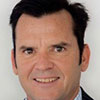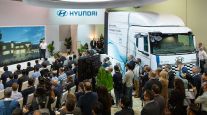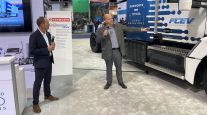Senior Reporter
Clean Technology Mix for Fleets Is Coming, Upstart Companies Say
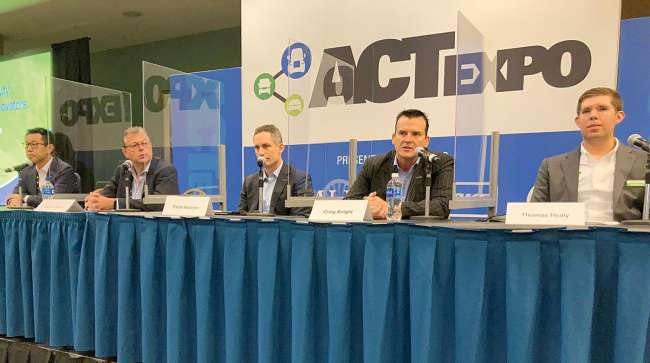
[Stay on top of transportation news: Get TTNews in your inbox.]
LONG BEACH, Calif. — The uncertain residual value of emerging zero-emission trucks is a concern of prospective buyers. But Craig Knight, CEO of fuel cell technology provider Hyzon Motors Inc., is offering reassurance to his customers.
“Every Hyzon truck is a little platinum mine. I’ll absolutely buy it back from you,” he said.
Platinum, a precious metal, is a catalyst used in generating electricity within fuel cells.
Knight and other executives spoke on the panel Upstarts and Innovators at Advanced Clean Transportation Expo Aug. 30-Sept. 2.
Customers are beginning to realize they likely will have to hold on to an electric vehicle a little longer compared with a new diesel to reach a payback and benefit, said Thomas Healy, founder and CEO of Hyliion Holdings Inc.
Hyliion® Announces Launch of Improved Hybrid Powertrain Solution – “Hybrid eX”
Read more: https://t.co/UozhhhUmsa — Hyliion (@hyliion) August 31, 2021
“The big question is going to be the batteries,” he said. “Do your batteries last to a point where you can continue to keep driving, or do you need to do a whole [battery] pack swap-out?”
Hyliion offers a hybrid electric axle and extended range technology that uses a generator fueled by natural gas, or eventually hydrogen, to charge batteries, allowing for an extended range of 1,000 miles.
“I think we are getting to a point where batteries are starting to last the life of the vehicle,” Healy said.
Knight noted with a fuel cell in a commercial vehicle, “The battery life is extended dramatically because you have a constant onboard conditioning system in a fuel cell keeping the battery happy.”
#ACTExpo Exclusive | Booth 2108#BYD's NEW 3rd Generation 8TT Class 8 Electric Day Cab Tractor!
See the new standard in performance, reliability, comfort & safety in heavy-duty #trucks.
Learn More: https://t.co/MBk7WuA0og#ElectricVehicles #Transportation #zeroemission pic.twitter.com/IMtYwyBZd0 — BYD (@BYDCompany) August 31, 2021
BYD North America already provides support and warranty coverage for its batteries for the life of its turnkey vehicles.
“That’s happening today,” said Patrick Duan, senior vice president of operations.
BYD delivered 200 electric trucks mainly in Classes 6-8 and 600 electric buses in the U.S. since 2014.
“We are getting a lot of good feedback from the industry, Duan said.
It is important to get financial partners involved in the turnkey business model, Duan noted, because that “even justifies the residual value, especially on the battery side.”
Every Hyzon truck is a little platinum mine.
Hyzon Motors Inc. CEO Craig Knight
Knight said Hyzon definitely could help fleet customers meet their total cost of ownership challenges “based on a local fuel supply for a back-to-base operation [as hydrogen currently is expensive to transport].”
“And over time, these [local] hubs become very strong nodes in a future network,” he said. “But we don’t create the network from the very beginning.”

Fleet managers find that healthy, happy drivers are key to business success. Stephen Kane of Rolling Strong says driver health starts with “being vulnerable enough to listen to somebody that knows about health.” Hear a snippet above, and get the full program by going to RoadSigns.TTNews.com.
Hydrogen is the smallest and lightest element on Earth, as well as the third-most plentiful one, after oxygen and silicon.
“In order to transport large amounts of hydrogen, it must be either pressurized and delivered as a compressed gas, or liquefied,” according to the U.S. Department of Energy. That delivery adds cost.
But DOE noted producing hydrogen on-site locally also can raise costs since production volumes are lower.
Hyzon and renewable fuels company Raven SR Inc. in August announced their first waste-to-green hydrogen production hub. It is located at Republic Services’ West Contra Costa Sanitary Landfill in Northern California and due to begin operations next summer.
Nikola Motor Corp. also is moving to produce hydrogen for its coming Class 8 model. The manufacturer also has a battery-electric Class 8 it is testing.
See you soon #ACTEXPO! pic.twitter.com/8Cc6V3nFqp — Nikola Motor Company (@nikolamotor) August 30, 2021
Nikola has secured a favorable rate with its local utility in Arizona, “taking advantage of electricity [to produce hydrogen] when the costs are low and stopping production when the costs are high,” said Pablo Koziner, Nikola’s president of energy and commercial.
The Phoenix-based company also recently invested $50 million in cash and stock in Wabash Valley Resources for a 20% equity interest in the clean hydrogen production from a project WVR is developing in West Terre Haute, Ind., that will use solid waste byproducts such as petroleum coke combined with biomass.
“It’s this continuous effort to look for opportunities where you can achieve feedstock,” Koziner said.
And Nikola received a $2 million DOE grant to advance research into autonomous refueling technologies for future hydrogen fueling stations.
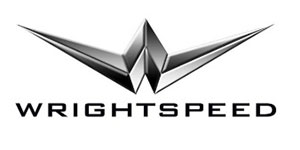
Wrightspeed Inc. CEO Gilbert Passin took a step back for a broader and global view of the present.
“We should not forget that there are more existing vehicles on the road than new vehicles coming in,” he said.
Wrightspeed provides a full powertrain solution that includes electric axles, battery packs, auxiliary electronics, and instrument cluster including software controls and telematics. It also has a range-extender module option, according to the company.
“So we need to offer a great solution to convert those existing vehicles into something cleaner and more economical,” he said. “There are countries that can’t afford new vehicles.”
Want more news? Listen to today's daily briefing below or go here for more info:


